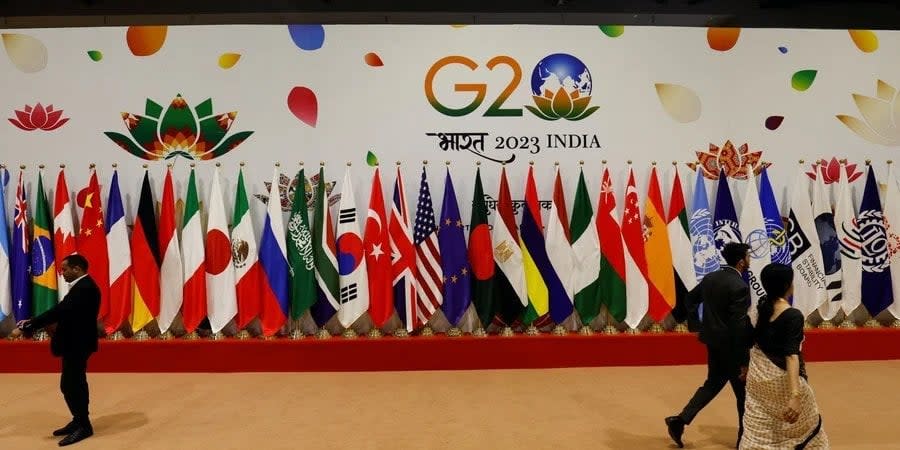G20 communique an ill omen for Ukraine

In the last days before the G20 summit in New Delhi on September 9-10, the world was watching with concern the diplomatic struggle over the wording of the "Ukrainian part" of the final joint statement.
Several times, the negotiators approached a "deadlock," refusing to approve the final document as a whole, which would be a sign of the failure of the Summit and a foreign policy fiasco for Indian PM Narendra Modi, who presided over the summit. Consultations took place at all levels, including among the group's leaders.
Firstly, the compromise wording on the "Ukrainian part" of the statement was a significant step backwards in the G20's position on the ongoing war compared to the last Bali Summit, which condemned Russian aggression against our country and called for the immediate withdrawal of Russian troops. This text also undermines the general consensus on UN General Assembly resolutions condemning Russian aggression and calling for its immediate cessation. There is a threat that the "Indian common denominator" of the G20 will become a new benchmark for many UN members, especially the countries of the Global South, and will be actively and effectively used, first of all, by Russian diplomacy in its efforts to dilute the next initiatives of the Ukrainian side.
Read also:
Erdogan lobbies G20 to compromise on Russian sanctions in bid to revive Ukraine grain corridor
G20 agrees on compromise declaration on Ukraine – without condemning Russia for its aggression
Secondly, the diminishing potential of Western diplomacy to influence the positions of the Global South on such an acute international problem as Russia's brutal violation of the UN Charter is of great concern. Whether it was a "goodwill gesture" by the West in favor of Modi, especially in the context of the 2024 Indian elections, or a real failure of Western leaders to convince their "southern" counterparts, the "Indian common denominator" marginalizes the issue of Russian aggression against Ukraine on the agenda of world leaders.
The "Indian common denominator" marginalizes the issue of Russian aggression against Ukraine
Thirdly, the results of the G20 Summit not only significantly complicate the tasks of Ukrainian diplomacy and President Volodymyr Zelenskyy during the next session of the UN General Assembly, but also undermine the inviolability of the principle of "nothing about Ukraine without Ukraine" and further efforts to successfully hold the Global Peace Summit, and call into question the effectiveness of the much-hyped format of diplomatic advisers. After all, it is clear that the field for diplomatic maneuvers has now narrowed considerably, and advisors from the Global South will be reluctant to go beyond the new consensus position of the G20.
Fourth, the "Indian common denominator" is further threatened by such a symbolic circumstance as Russia’s illegal local elections in occupied territories of Ukraine. The fact that they took place on the days of the G20 Summit in New Delhi casts an additional shadow over the outcome of the event regarding Ukraine. And this shadow is not only threatening, but also dangerous. The consensus that seemed to unite the world to put even more pressure on the aggressor ultimately failed. Just as the outcomes of the G20 foreign ministers' meeting in March this year, also under the Indian presidency, were lost, when the common language indicated a tendency to gradually increase pressure on Moscow, not the other way around.
Fifth, the controversial outcome of the Summit is a signal that the space for domestic political mistakes is shrinking for our country. Any internal, even the smallest, miscalculation will be exaggerated by Russian propaganda to undermine Ukraine's international position.
We hope that Ukrainian diplomacy will carefully analyze the causes and consequences of such an ambiguous communique and adjust its own strategic and communication approaches.
Read also: Russia targeted civilian ship in Odesa, Ukrainian IT sector state, enemy tortures 90% of POWs
Obviously, we are entering a new stage in the fight against the Russian aggressor, when emotions will no longer have such a powerful effect as in the first days of the full-scale invasion. Accordingly, the presence of [Russian Foreign Minister Sergei] Lavrov or any other Kremlin emissary will not be as disgusting as it used to be. Therefore, efforts should be stepped up to counter Russian diplomacy's attempts to use the "New Delhi precedent" to further deepen Russia's current level of isolation. The classics of international relations suggest that with each new day of the war, more and more "arguments" will be heard about the need to bring Russia back to the diplomatic table. For this, for example, it is enough to look at the example of Syria’s Bashar al-Assad and the normalization of relations with him, despite the position of the United States.
The world is changing, and this must be taken into account if we are to achieve the long-awaited and necessary victory for Ukraine.
We’re bringing the voice of Ukraine to the world. Support us with a one-time donation, or become a Patron!
Read the original article on The New Voice of Ukraine

